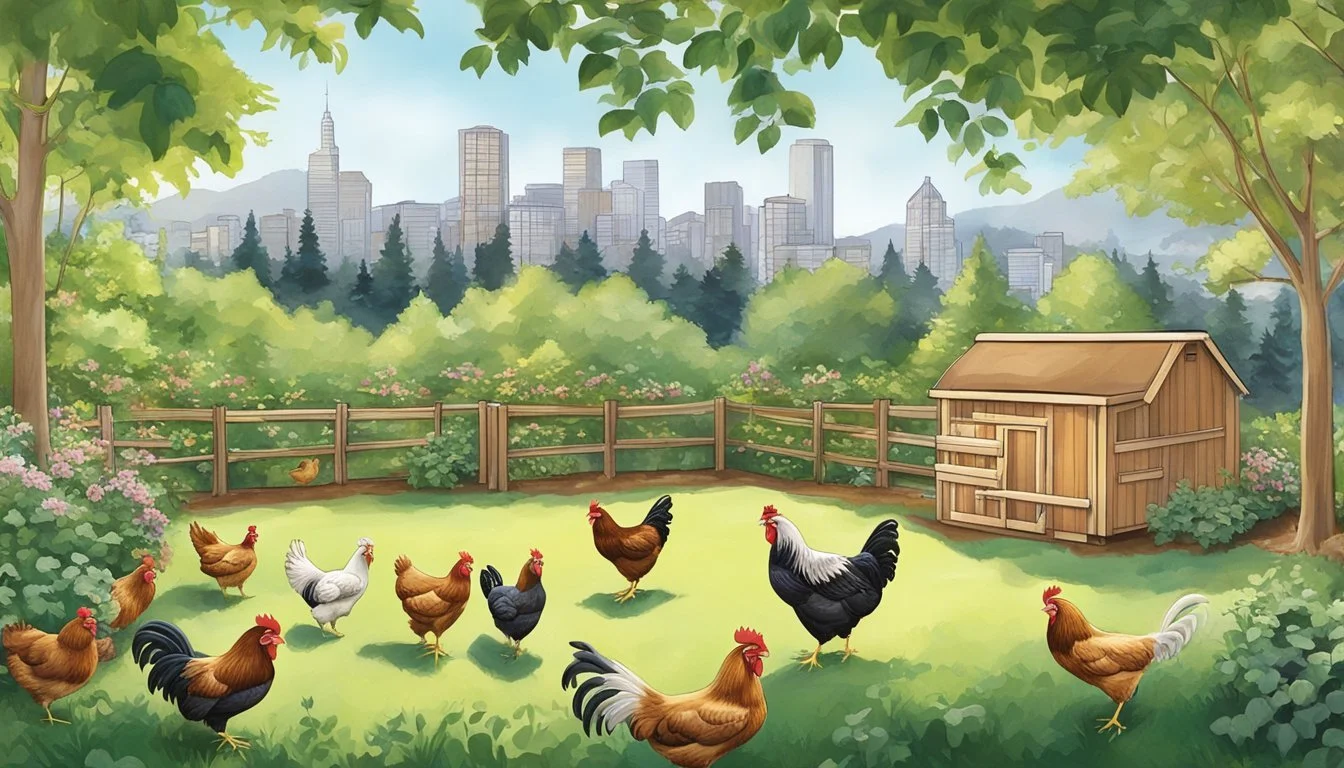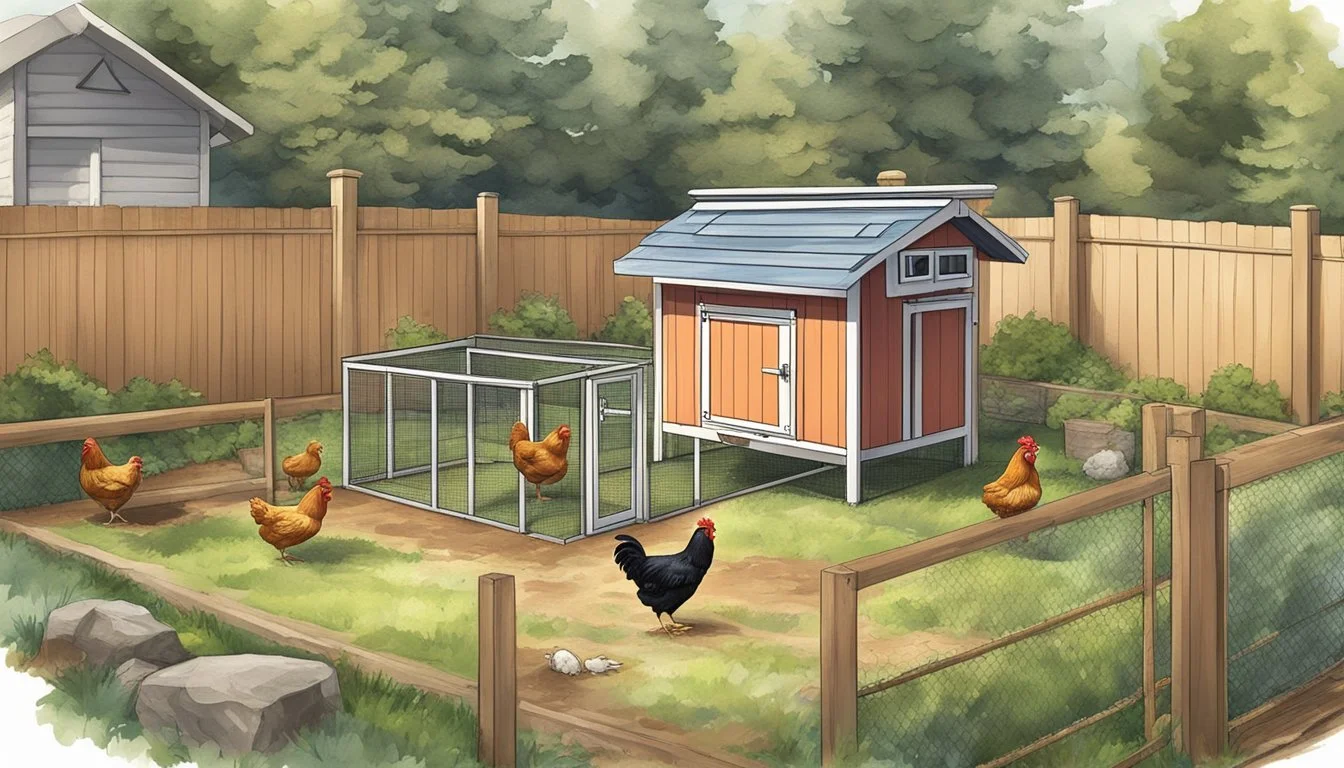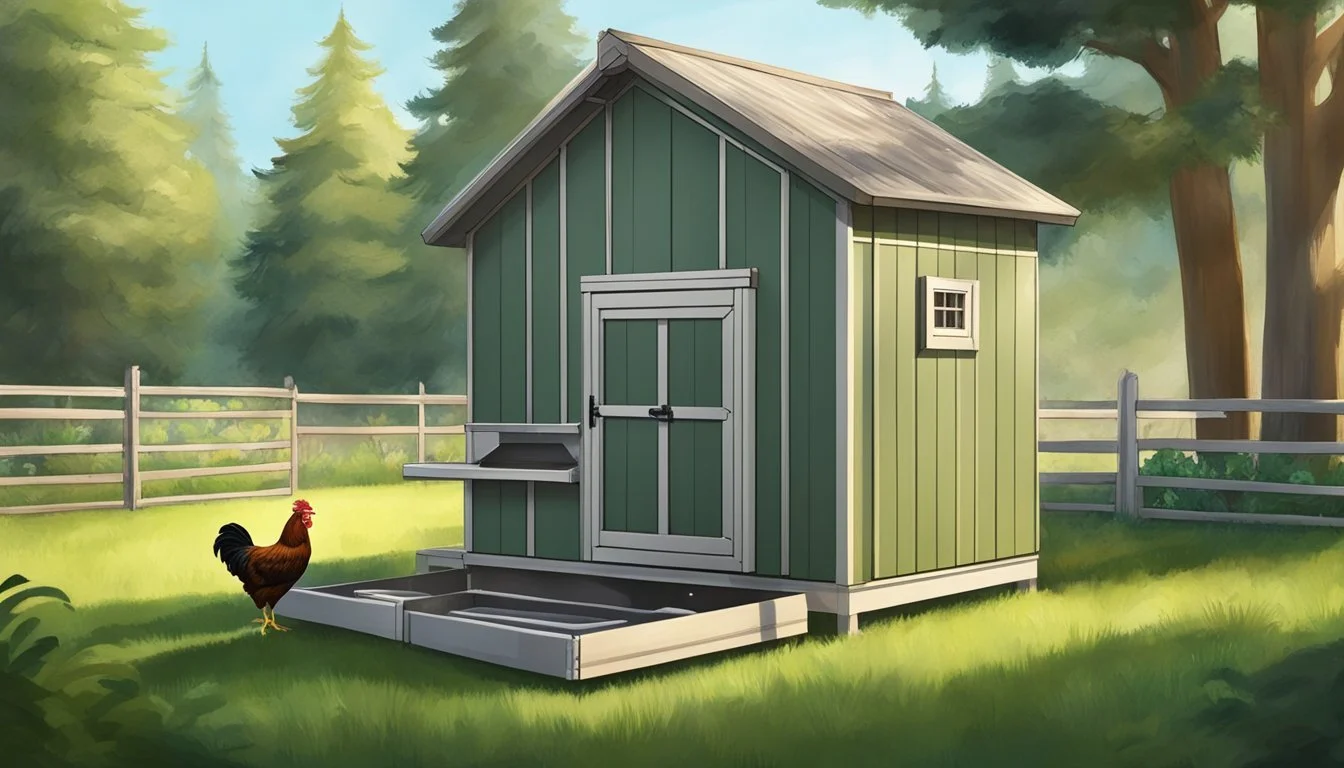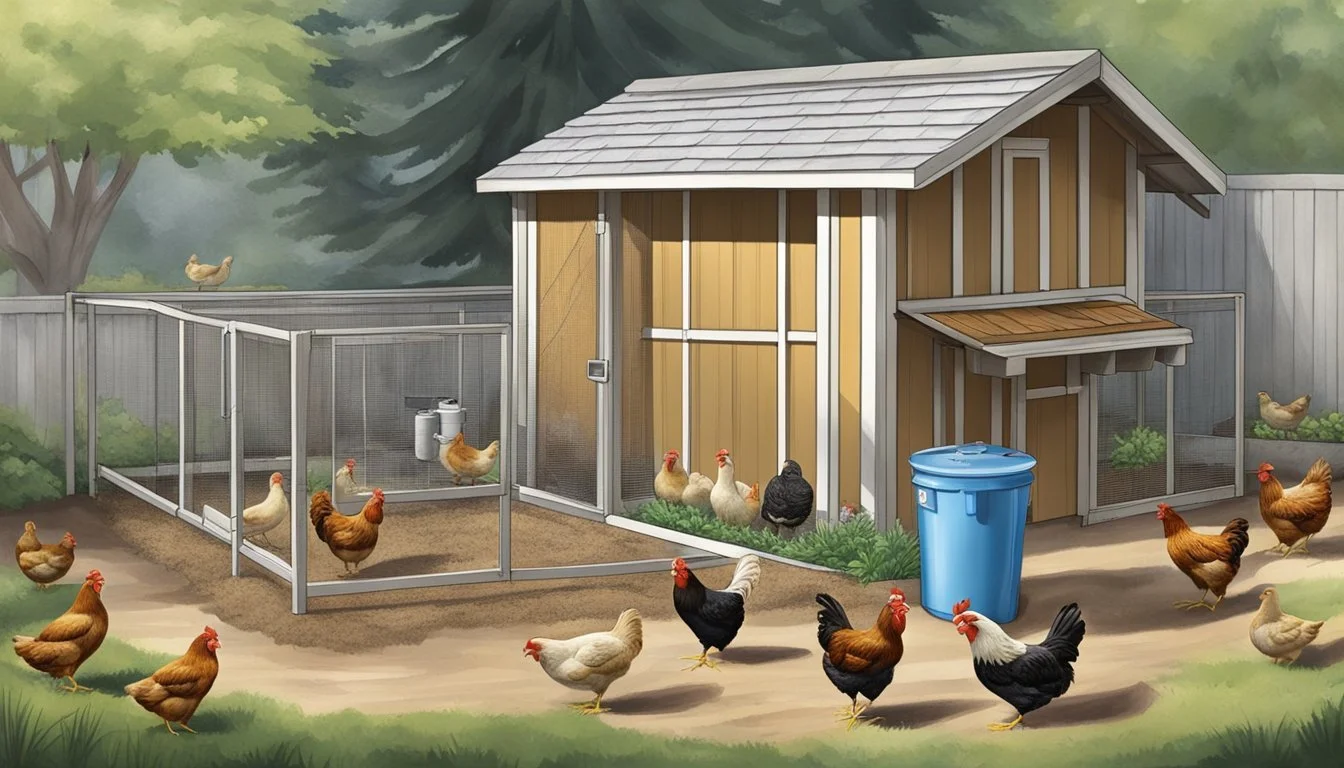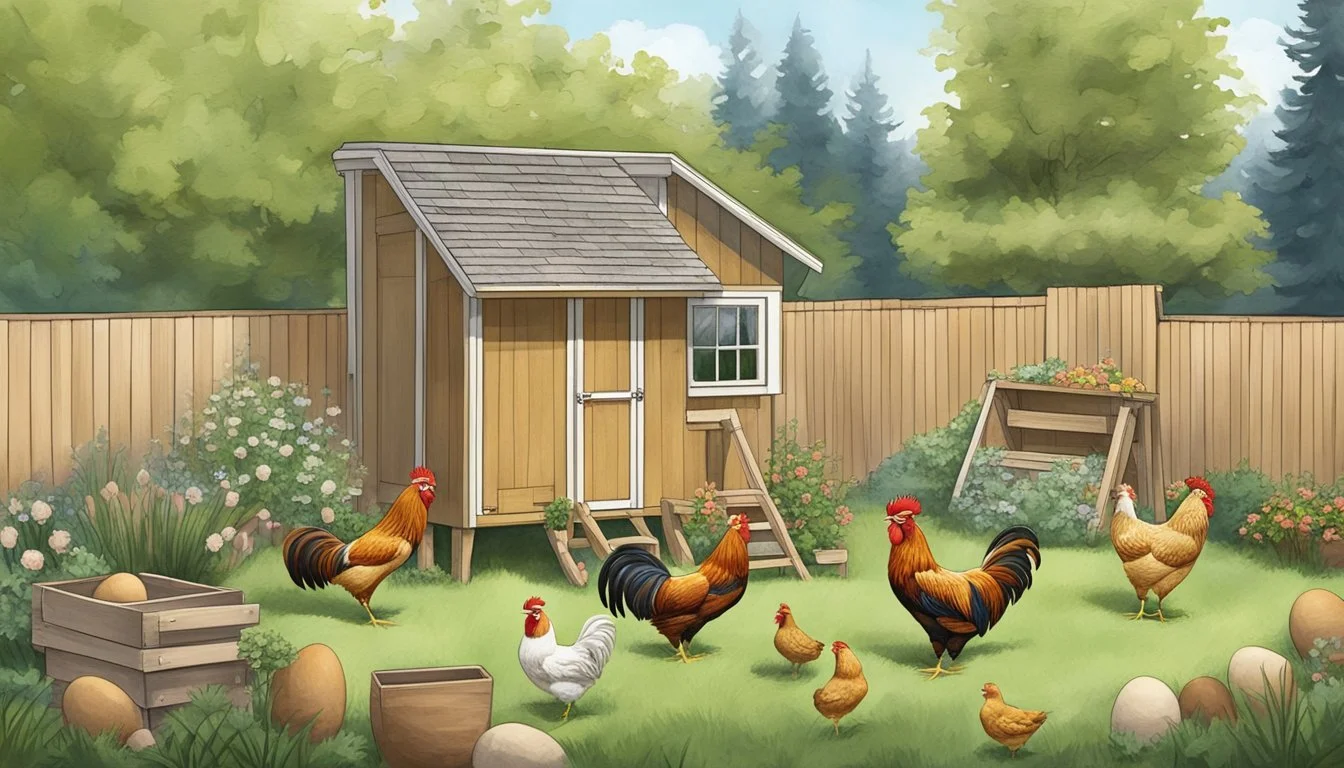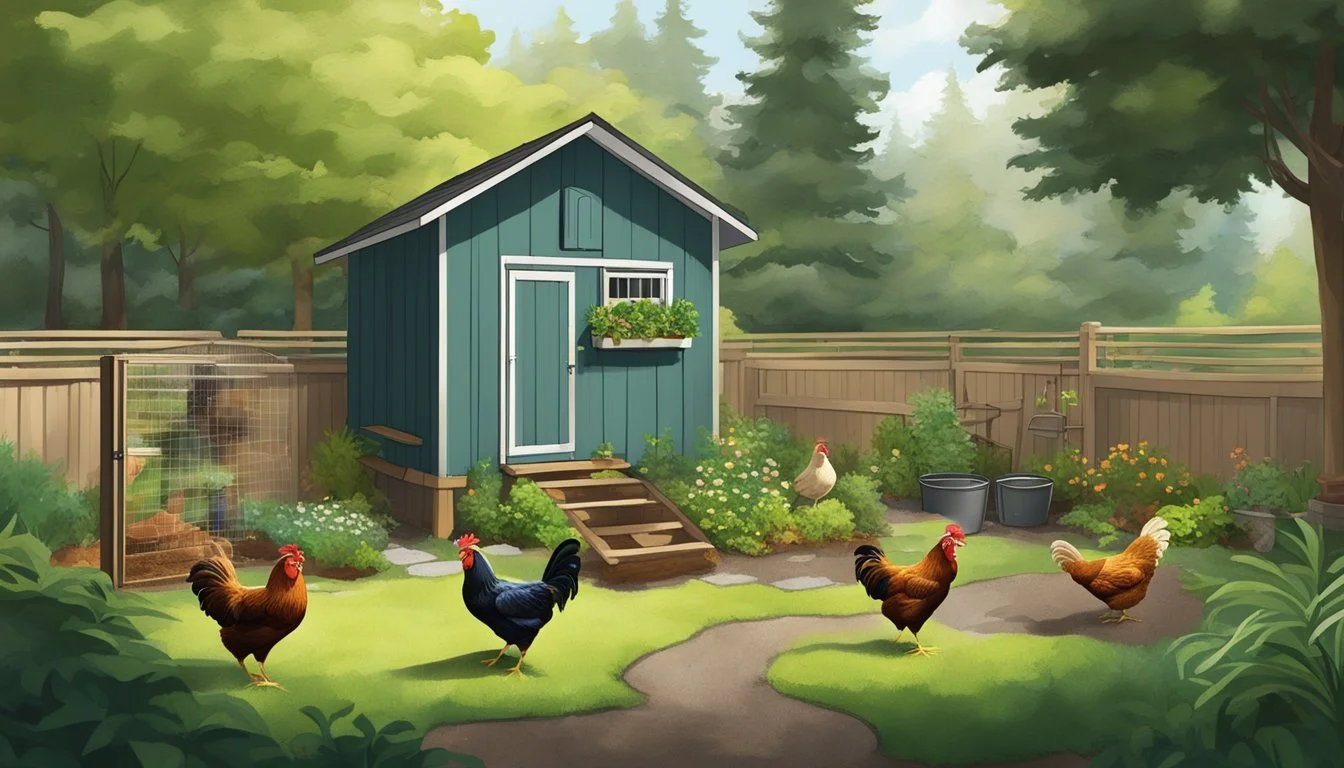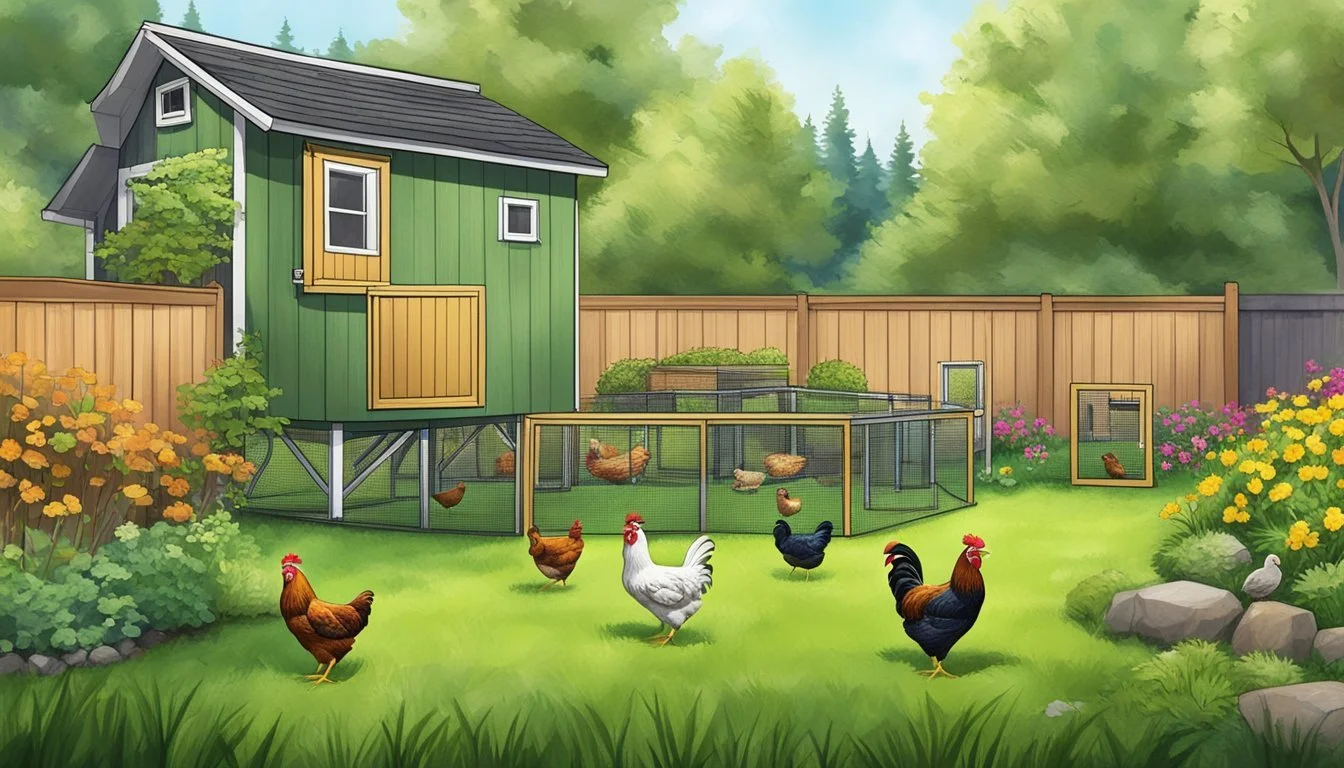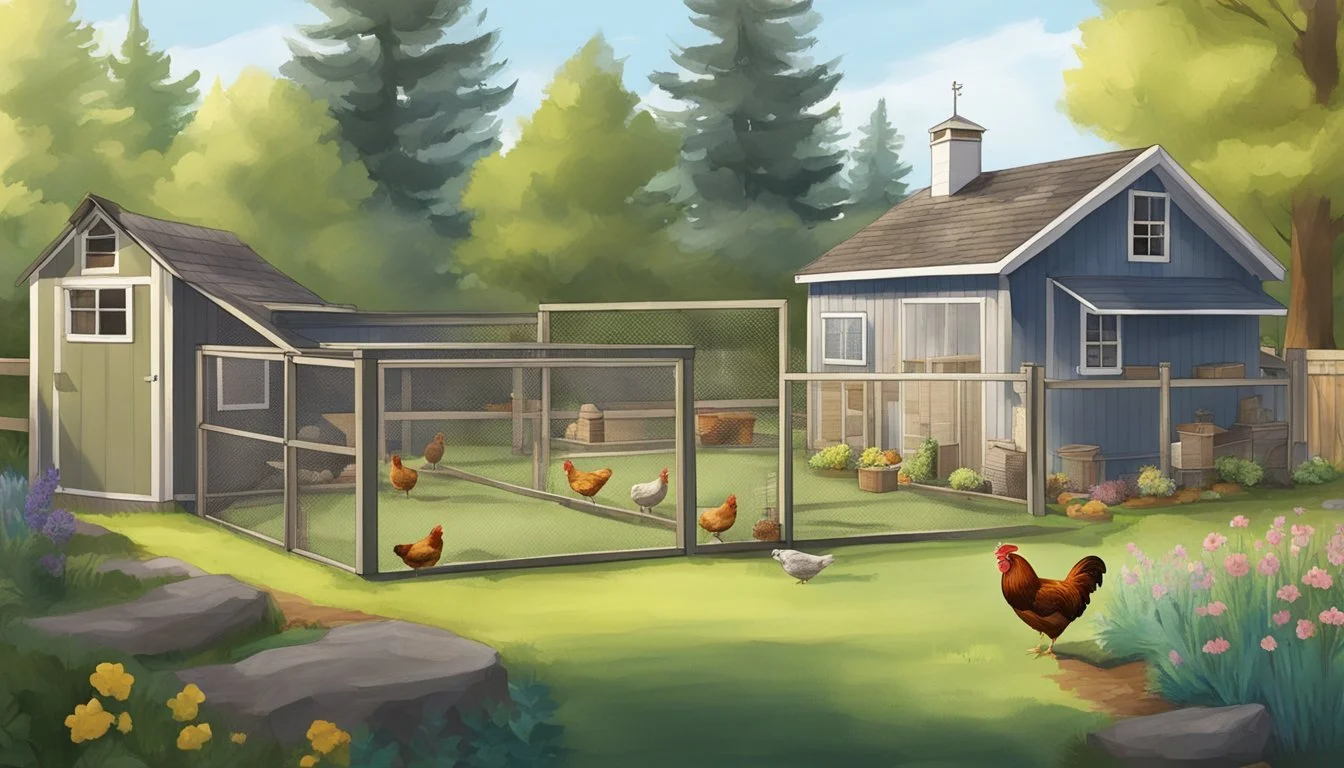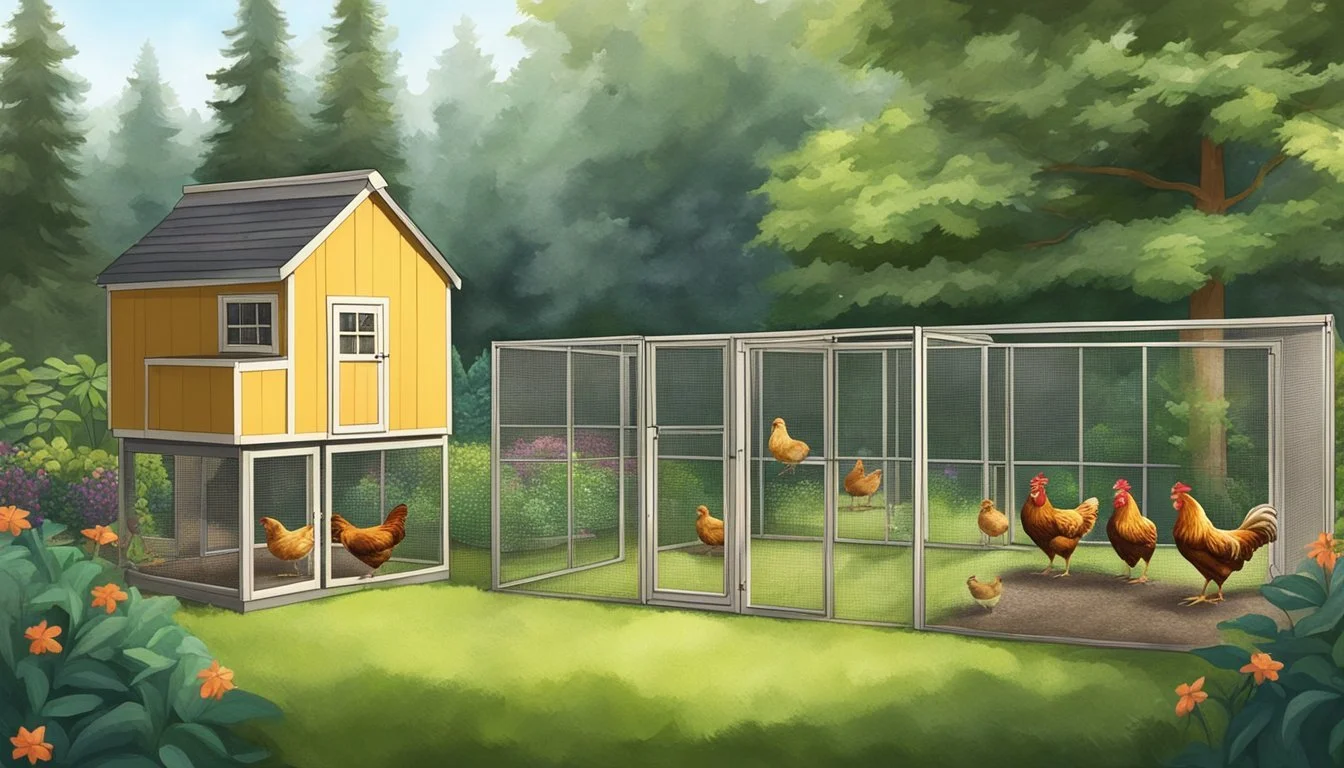Raising Backyard Chickens in Bremerton, WA
Essential Tips for Urban Poultry Farmers
Raising backyard chickens has become an increasingly popular practice for those looking to produce their own eggs and gain a closer connection to their food source. In Bremerton, Washington, this trend is embraced within the community, with specific guidelines ensuring it’s done responsibly. Residents of Bremerton are allowed to keep a maximum of five chickens in their backyards, providing an opportunity to engage in small-scale, sustainable poultry farming.
However, the city does not allow roosters, and a permit is required to keep chickens legally. The permitting process is part of the city’s initiative to maintain public health and safety while allowing residents to enjoy the benefits of raising chickens. Coop restrictions are also in place, aimed at promoting the welfare of the chickens and minimizing any potential nuisance to neighbors.
As an urban farmer in Bremerton, understanding and adhering to these regulations is vital. The Kitsap Humane Society oversees the licensing of backyard chickens, illustrating Bremerton’s dedication to animal welfare. For those interested in this rewarding hobby, the city offers clear guidance and support to ensure that both chickens and residents can coexist happily and healthily.
Understanding Local Chicken Laws
Before diving into chicken ownership in Bremerton, WA, it is crucial to understand local ordinances and restrictions. This ensures compliance with laws and maintains neighborly harmony.
Bremerton's Backyard Chicken Ordinance
Bremerton requires residents to obtain a Chicken License if they wish to keep chickens. The ordinance outlines specific rules that keepers must follow to maintain their permit.
Permits and Number of Chickens Allowed
The City of Bremerton stipulates that up to five chickens are allowed per single-family residential lot. A permit, renewable annually, is mandatory. No permit means no chickens. For permit applications, the Kitsap Humane Society is the go-to source.
Coop Restrictions and Location Guidelines
Coop size and location are regulated to ensure safety and cleanliness. Bremerton’s guidelines mandate that coops must be well-maintained and located in a manner that does not disturb neighbors or infringe on property boundaries.
Noise and Neighbor Considerations
The keyhere is minimizing disruption. Neighbors’ peace is paramount, and as such, chicken owners are expected to manage noise levels. This includes making sure chickens are not causing a nuisance.
Regulations on Roosters in Residential Areas
While the city allows for the keeping of chickens, the laws are stricter regarding roosters. Due to noise concerns, roosters are generally not permitted in residential areas. Confirm with local laws for any exceptions.
For additional details, residents can contact the Kitsap Humane Society or check Bremerton's official website. There, chicken enthusiasts will find resources and applications to ensure their backyard coop is within the bounds of the law.
Setting Up Your Chicken Coop
Setting up the right chicken coop in Bremerton, WA is critical for the wellbeing of backyard chickens. This includes choosing a location that provides comfort, designing for the local climate, and ensuring robust security against potential predators.
Choosing the Right Location
When selecting a spot for a chicken coop in Bremerton, one must consider several key factors to ensure the health and productivity of the chickens. Ideally, the coop should be:
Elevated: To prevent waterlogging during rainy seasons.
Well-ventilated: To ensure proper air circulation while protecting against drafts.
East-facing: To provide the chickens with warmth from the morning sun.
Accessible: Positioned for easy access by the owner for cleaning and egg collection, while considering the noise and distance from neighbors.
Designing a Chicken Coop for Bremerton Climates
Bremerton's climate, with its wet conditions and moderate temperatures, requires a coop design that can protect the chickens while maintaining a comfortable living environment.
Insulation: Proper insulation should be installed to keep the coop warm during winters and cool in summers.
Roofing: A waterproof roof will protect from heavy Washington rains, perhaps with a slant to prevent water accumulation.
Materials: Use rot-resistant materials like cedar that can withstand damp conditions.
Security Against Predators
Chickens in Bremerton may face threats from local predators such as raccoons, cats, dogs, and even eagles. Robust security measures are non-negotiable:
Fencing: A sturdy fence buried at least a foot deep to deter digging animals; hardware cloth is preferable to chicken wire.
Locks: Secure locking mechanisms for coop doors to prevent clever predators like raccoons from gaining entry.
Roof: The outdoor run should have a secured roof or netting to protect against aerial predators.
By considering these focused aspects, one can provide a safe and nurturing environment for backyard chickens.
Chicken Care and Management
Caring for chickens in Bremerton, WA, requires adhering to local ordinances, understanding their dietary needs, maintaining their health, and managing their social structure. Proper management ensures hens lead healthy and productive lives.
Feeding Your Chickens
Chickens require a balanced diet to maintain their health and egg production. Feed typically consists of a high-quality commercial poultry ration. For chicks, a starter feed is crucial; as they grow, they transition to grower feed and eventually layer feed for laying hens. Supplementary foods like grains, vegetables, and occasional treats can be provided, but should not exceed 10% of their total diet.
Managing Chicken Health
A healthy chicken is active, alert, with a good appetite, and has a clean, glossy plumage. They need a clean coop, fresh water, and regular check-ups to monitor for signs of illness. Vaccinations may be administered to protect against common diseases. Bremerton residents must be aware that up to five hens are allowed per single-family residential lot, and maintaining a clean, odor-free, and vermin-free coop is imperative for compliance and the chickens' well-being.
Understanding the Pecking Order
The pecking order is a stable hierarchy established by chickens that dictates their social standing and access to resources. New hens or chicks introduced into a flock must be integrated with care to avoid disruption. Observing chickens' interactions can provide insights into the flock’s harmony, and steps may be taken to manage bullying or aggression to ensure all hens can feed and roam without undue stress.
Egg Production Essentials
In Bremerton, WA, backyard chicken enthusiasts can optimize their hens' egg production through specific practices and ensure the eggs' quality with proper handling and storage.
Maximizing Egg Production
Successful egg production begins with selecting the right breeds for the climate of Bremerton. Australorps, Plymouth Rocks, and Rhode Island Reds are known for their prolific laying abilities. Hens typically start laying eggs at around 18 to 24 weeks of age and can produce efficiently for several years, though production may decline as they age.
Light: Provide at least 14 hours of light per day to encourage steady egg production.
Nutrition: Offer a balanced diet designed for layers, usually a 16% protein layer feed, and supplement with calcium for strong shells.
Health: Regular health check-ups can prevent diseases that impact egg production.
Adhering to these practices will support hens in laying an average of 4 to 5 eggs per week.
Handling and Storing Eggs
Once eggs have been laid, their freshness and safety rely on proper handling and storage.
Collection: Gather eggs at least once a day.
Cleaning: Wipe off any dirt with a dry cloth or use a damp cloth for stubborn stains and dry immediately.
Storage: Store eggs in a cool, consistent environment, ideally in the refrigerator at temperatures below 40°F (4°C).
Remember, unwashed eggs have a natural protective coating called the "bloom" and can be stored at room temperature for short periods. Washing removes this layer but refrigeration then becomes essential to maintain quality and safety.
Community and Environmental Impact
Raising backyard chickens in Bremerton, WA, comes with its unique set of responsibilities, particularly in maintaining a balance between the benefits of urban poultry and the potential impact on the community and environment.
Dealing With Waste and Compost
Chicken manure is a potent fertilizer rich in nitrogen, which is beneficial for garden composting. However, it must be managed properly to prevent mess and smell. Residents can achieve this by:
Establishing a compost system to handle waste, thus minimizing odor and its attraction to pests.
Regularly turning the compost to aid in decomposition and reduce any offensive odors that could trouble neighbors.
Addressing Noise and Smell Issues
The presence of chickens can lead to noise, primarily from roosters, which are often not allowed in urban settings due to their loud crowing. To mitigate noise and smell concerns, chicken owners should:
Keep the coop clean to contain smells and maintain a healthy environment for both chickens and nearby residents.
Choose hen breeds known for being quieter, and avoid keeping roosters, if local ordinances prohibit them.
Being a Considerate Chicken Owner
Good chicken husbandry transcends routine care and extends into being mindful of one’s neighbors. Considerate chicken owners in Bremerton should:
Communicate with their neighbors to address concerns regarding noise or smell before they escalate.
Maintain the chicken coop in a neat, orderly fashion to prevent any disagreeable mess from affecting surrounding properties.
Advanced Topics in Poultry Keeping
As one delves into the world of poultry keeping, certain advanced topics become crucial for success. These include the intricacies of breeding chickens, understanding the wide range of chicken breeds and making selections, and engaging with the community through chicken shows.
Breeding Chickens
Breeding chickens in one's backyard can be a gratifying experience. When selecting a breed of chicken to breed, it is essential to consider both the genetic traits and the physical health of the birds. A well-maintained chicken run is vital to prevent overcrowding and ensure the well-being of the breeding flock. Detailed records of lineage, egg production, and hatch rates are also critical for successful breeding.
Key Considerations for Breeding:
Genetic Diversity: Avoid inbreeding to maintain a healthy flock.
Pair Selection: Carefully pair roosters and hens based on traits.
Incubation: Monitor temperature and humidity for optimal hatch rates.
Chicken Varieties and Choosing Breeds
Choosing the correct chicken breed often depends on the keeper's goals: whether it is for egg production, meat, show, or simply as a backyard pet for pleasure. There are numerous breeds, each with its unique characteristics and care requirements.
Popular Breeds for Different Goals:
Purpose Recommended Breeds Egg production Leghorn, Sussex Meat Cornish, Orpington Show Silkie, Brahma Backyard pet Plymouth Rock, Wyandotte
When planning a vacation, it is crucial to ensure that care for these breeds continues in the owner's absence.
Showing Chickens and Community Engagement
Showing chickens is a rewarding way to engage with the poultry community. Keepers must understand the specific breed standards and prepare their chickens accordingly. Community engagement through events like these can also lead to opportunities for sharing knowledge and experience.
Preparation for Shows:
Grooming: Regular bathing and grooming to meet breed standards.
Documentation: Comprehensive records of the chicken's lineage and health.
Training: Familiarizing chickens with handling and show environments.
Participation in chicken shows requires dedication but it can enhance one's reputation as a knowledgeable poultry keeper.
Resources and Additional Information
When raising backyard chickens in Bremerton, WA, several resources can provide invaluable support and guidance. From local communities to educational workshops, residents can leverage these resources to ensure a successful and compliant backyard chicken experience.
Local Chicken Keeping Communities
Local chicken keeping communities offer a network for poultry enthusiasts. BackYard Chickens is a platform where individuals can exchange tips, share experiences, and ask questions about urban poultry farming. For a more hands-on approach, residents might find communities at local feed stores or by attending city council meetings, where they can connect with experienced backyard chicken keepers in Bremerton.
Educational Resources and Workshops
For those seeking knowledge, various educational resources and workshops are available. The Washington State Department of Agriculture occasionally offers workshops related to poultry health and management. Kitsap Humane Society, though its primary focus is on cats and dogs, may provide references or materials relevant to chicken care. Additionally, the Internet is replete with online courses and guides pertaining to chicken care, coop building, and maintenance.
Contact Information for Further Guidance
In matters requiring direct assistance or further clarity, contacting the relevant authorities is recommended. Residents can reach out to the Bremerton Animal Control for information on local ordinances and compliance requirements. Here is their contact information for quick reference:
Bremerton Animal Control: Link for more information
Kitsap Humane Society: www.kitsap-humane.org | (360) 731-xxxx
For regulatory and health-related inquiries, the Washington State Department of Agriculture's Avian Health Program provides helpline numbers for reporting sick or deceased birds. They can be reached at 1-800-606-3056 for avian health concerns.
Summary and Next Steps
When embarking on the journey of raising backyard chickens in Bremerton, Washington, prospective chicken owners should follow a systematic approach to ensure compliance with local regulations and the well-being of their fowl.
Initial Verification:
Residents should verify local ordinances related to backyard chickens, including coop specifications, number of chickens allowed, and any permit requirements.
It's imperative to check zoning regulations specific to residential areas in Bremerton for any additional stipulations.
Preparation:
Choose appropriate chicken breeds for the Bremerton climate and their intended purpose, whether for egg production, as pets, or for their temperament.
Prepare the yard and design a coop that provides sufficient shelter, space, and security for the chickens. Include areas for them to roam, feed, and nest comfortably.
Health and Maintenance:
Provide regular care, including feeding, watering, and cleaning the coop to maintain the chickens' health.
Establish a routine to monitor for any signs of distress or illness, and consult with a veterinarian if necessary.
Community Engagement:
Engaging with local chicken enthusiasts or joining community groups can provide additional support and insights.
Continual Learning:
New chicken owners should continue learning about best practices for raising chickens, attending workshops, and staying informed about any changes in local ordinances.
By following these structured steps, anyone in Bremerton can start raising backyard chickens responsibly and enjoy the rewards of fresh eggs, natural pest control, and the joy of caring for these animals.

